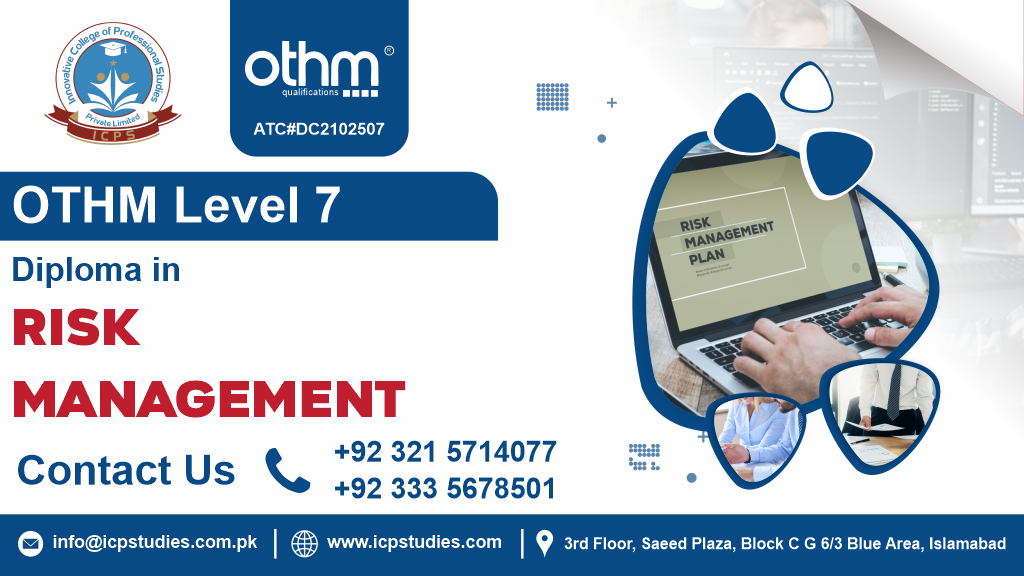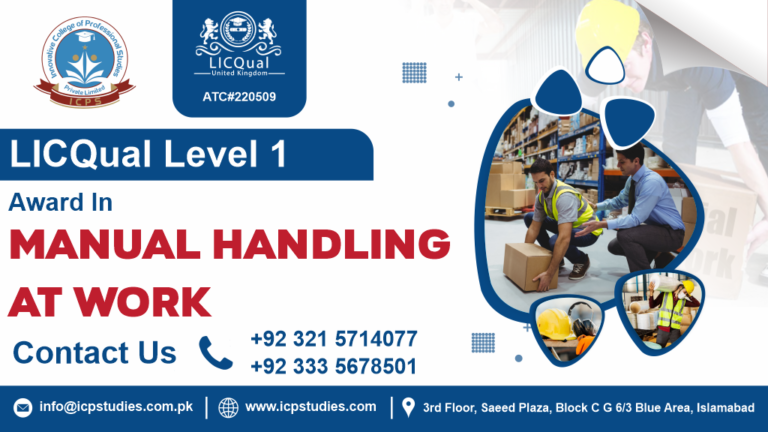“Mitigate Risks, Maximize Success: Unlock Your Potential with OTHM’s Level 7 Diploma in Risk Management”
Are you prepared to embrace uncertainty and guide your organization toward triumphant success? Unleash your full potential and ascend to mastery in the field of risk management through the OTHM Level 7 Diploma in Risk Management.
In today’s dynamic business landscape, risks are inevitable. Organizations face a myriad of challenges that can impact their growth, reputation, and financial stability. That’s why effective risk management is crucial for survival and thriving in the competitive market.
With the OTHM Level 7 Diploma in Risk Management, you will gain comprehensive knowledge and skills to identify, assess, and mitigate risks effectively. Our industry-focused program combines theoretical foundations with practical applications, ensuring you acquire the expertise to make informed decisions and protect your organization’s interests.
From strategic risk assessment to operational risk management, our curriculum covers a wide range of topics. You will learn to develop risk management frameworks, implement robust strategies, and analyze potential threats across various business functions.
Our experienced instructors, who are industry experts, will guide you through real-world case studies and simulations, providing valuable insights into risk management best practices. You will also have access to cutting-edge tools and software used in the field, giving you hands-on experience in risk modeling and analysis.
By the end of the program, you will be equipped with the skills to anticipate, evaluate, and respond to risks effectively. You will have the ability to develop risk mitigation plans, implement risk monitoring systems, and make strategic decisions that safeguard your organization’s success.
Elevate your career prospects and become a trusted risk management professional. The OTHM Level 7 Diploma in Risk Management opens doors to a wide range of opportunities in industries such as finance, insurance, consulting, and project management. Employers value professionals who can protect their assets, mitigate threats, and ensure sustainable growth.
Don’t let risks hold you back. Embrace the OTHM Level 7 Diploma in Risk Management and become the driving force behind your organization’s success. Enroll today and unlock a world of possibilities in the ever-evolving field of risk management.
Take the first step towards a rewarding career in risk management. Visit our website to secure your place in the next cohort and embark on a transformative learning journey with the OTHM Level 7 Diploma in Risk Management.
Innovative College of Professional Studies (Private) Limited is approved training centre of Organisation for Tourism and Hospitality Management (OTHM). ICPS OTHM ATC Number is DC2102507
All About OTHM Level 7 Diploma in Risk Management
Course Overview
The OTHM Level 7 Diploma in Risk Management offers a meticulously designed program aimed at equipping learners with the expertise and capabilities necessary to proficiently navigate and mitigate risks in today’s dynamic business environment. This diploma provides a comprehensive exploration of core principles, methodologies, and cutting-edge strategies in risk management across various industry domains.
Throughout the curriculum, learners delve into the intricacies of risk assessment, analysis, and mitigation, enabling them to make well-informed decisions that minimize potential threats and maximize organizational success. Covering both strategic and operational aspects, the program ensures a holistic understanding of risk management.
Beginning with fundamental concepts, learners are introduced to risk management essentials, including risk identification, categorization, and the development of risk management frameworks. They gain insights into diverse risk types such as financial, operational, reputational, and compliance risks.
The course progresses into advanced topics such as risk assessment techniques, emphasizing data-driven decision-making through quantitative and qualitative methods, scenario modeling, and sensitivity analysis. Learners also explore risk response strategies including avoidance, transfer, reduction, and acceptance, along with the role of insurance and diversification.
Emerging risk factors like cybersecurity, supply chain, and environmental risks are also addressed, preparing learners to tackle contemporary challenges with innovative approaches.
Practical application is emphasized through case studies, simulations, and group exercises, allowing learners to develop risk management plans and present recommendations. Ethical considerations and corporate governance are integrated, ensuring learners understand the importance of ethical conduct and compliance.
Guided by experienced instructors and supported by a range of learning resources, graduates emerge equipped to pursue careers as risk managers, analysts, compliance officers, or consultants across diverse industries.
Embark on a transformative journey in risk management with the OTHM Level 7 Diploma. Visit our website to secure your place and become a trusted leader in identifying, assessing, and mitigating risks.
Learning Outcomes
Upon completion of the OTHM Level 7 Diploma in Risk Management, learners will be able to:
- Understand Risk Management Principles: Demonstrate a comprehensive understanding of the fundamental principles, concepts, and theories of risk management, including risk identification, assessment, analysis, and mitigation.
- Apply Risk Management Frameworks: Develop and implement robust risk management frameworks, policies, and procedures that align with industry standards and organizational objectives.
- Conduct Risk Assessments: Utilize quantitative and qualitative risk assessment techniques to identify and evaluate risks, considering their potential impact and likelihood of occurrence.
- Analyze Risk Scenarios: Analyze and interpret risk scenarios using data-driven approaches, applying statistical methods, sensitivity analysis, and scenario modeling to assess potential outcomes and make informed decisions.
- Develop Risk Mitigation Strategies: Design and implement effective risk mitigation strategies that address identified risks, considering risk appetite, risk tolerance, and available risk response options.
- Monitor and Evaluate Risks: Establish risk monitoring and evaluation mechanisms to continuously assess and review risks, ensuring the effectiveness of risk management strategies and making necessary adjustments as required.
- Enhance Compliance and Corporate Governance: Comprehend the legal, regulatory, and ethical frameworks governing risk management, incorporating ethical considerations and promoting transparency in risk management practices.
- Communicate Risk Information: Effectively communicate risk-related information to stakeholders, utilizing appropriate techniques and tools to present complex concepts in a clear and concise manner.
- Apply Risk Management in Contemporary Contexts: Understand and address emerging risks, such as cybersecurity threats, supply chain disruptions, and environmental risks, adapting risk management strategies to changing business landscapes.
- Lead Risk Management Initiatives: Demonstrate leadership skills in driving risk management initiatives, collaborating with multidisciplinary teams, and promoting a risk-aware culture within organizations.
By achieving these learning outcomes, learners will possess the skills and knowledge necessary to navigate complex risk environments, make informed decisions, and contribute to organizational resilience and success in various industries.
Admission Criteria
For entry onto the OTHM Level 7 Diploma in Risk Management qualification, learners must possess:
- An honours degree in related subject or UK level 6 diploma or an equivalent overseas qualification
- Mature learners with management experience (learners must check with the delivery centre regarding this experience prior to registering for the programme)
- Learners must be 21 years old or older at the beginning of the course
- English requirements: If a learner is not from a majority English-speaking country must provide evidence of English language competency.
Ideal Candidate
The OTHM Level 7 Diploma in Risk Management is ideally suited for individuals who possess the following characteristics and aspirations:
- Professionals in Risk Management: This course is suitable for professionals already working in risk management roles who wish to enhance their knowledge and skills, broaden their understanding of best practices, and stay updated with the latest industry trends.
- Aspiring Risk Managers: Individuals aspiring to become risk managers or advance their careers in risk management will benefit from this course. It provides a solid foundation and comprehensive understanding of risk management principles and practices.
- Business Executives and Managers: Business executives and managers responsible for decision-making and organizational risk oversight can gain valuable insights from this course. It equips them with the knowledge and tools to assess risks, make informed decisions, and implement effective risk management strategies.
- Risk Analysts and Consultants: Risk analysts and consultants looking to deepen their expertise in risk management will find this course beneficial. It provides a broader perspective and a comprehensive understanding of risk assessment, analysis, and mitigation techniques.
- Compliance Professionals: Compliance professionals seeking to enhance their risk management capabilities and align risk management practices with legal and regulatory requirements will find this course valuable. It covers compliance considerations and the integration of risk management with corporate governance frameworks.
- Finance and Insurance Professionals: Professionals working in finance, insurance, or related industries can expand their skill set by enrolling in this course. It provides a solid understanding of financial risks, insurance principles, and risk management strategies specific to these sectors.
- Project Managers: Project managers involved in complex projects and seeking to identify, assess, and manage project risks effectively will benefit from this course. It equips them with the tools and techniques to incorporate risk management into project planning and execution.
- Career Changers: Individuals looking to transition into a career in risk management will find this course a valuable stepping stone. It provides the necessary knowledge and skills to enter the field and pursue opportunities as risk analysts, risk managers, or compliance officers.
- Analytical Thinkers: Individuals with strong analytical and critical thinking skills, who enjoy problem-solving and making data-driven decisions, are well-suited for this course. Risk management requires the ability to analyze complex information, evaluate potential outcomes, and develop effective risk mitigation strategies.
- Continuous Learners: Candidates with a growth mindset, a passion for learning, and a commitment to professional development will thrive in this course. Risk management is an evolving field, and staying updated with emerging trends and practices is crucial for success.
While these characteristics describe the ideal candidate, individuals from various educational backgrounds and industries can benefit from the OTHM Level 7 Diploma in Risk Management. The course provides a comprehensive foundation in risk management principles, equipping learners with the skills and knowledge necessary to excel in the field.
Key Takeaways
The OTHM Level 7 Diploma in Risk Management qualification consists of 6 mandatory units for a combined total of 120 credits, 1200 hours Total Qualification Time (TQT) and 600 Guided Learning Hours (GLH) for the completed qualification.
Mandatory Units
The OTHM Level 7 Diploma in Risk Management consists of the following modules:
The OTHM Level 7 Diploma in Risk Management qualification enables learners to progress into or within employment and/or continue their further study. As this qualification is approved and regulated by Ofqual (Office of the Qualifications and Examinations Regulation), learners are eligible to progress to Master’s top-up at many universities in the UK and overseas with advanced standing.
FAQs Related to OTHM Level 7 Diploma in Risk Management







